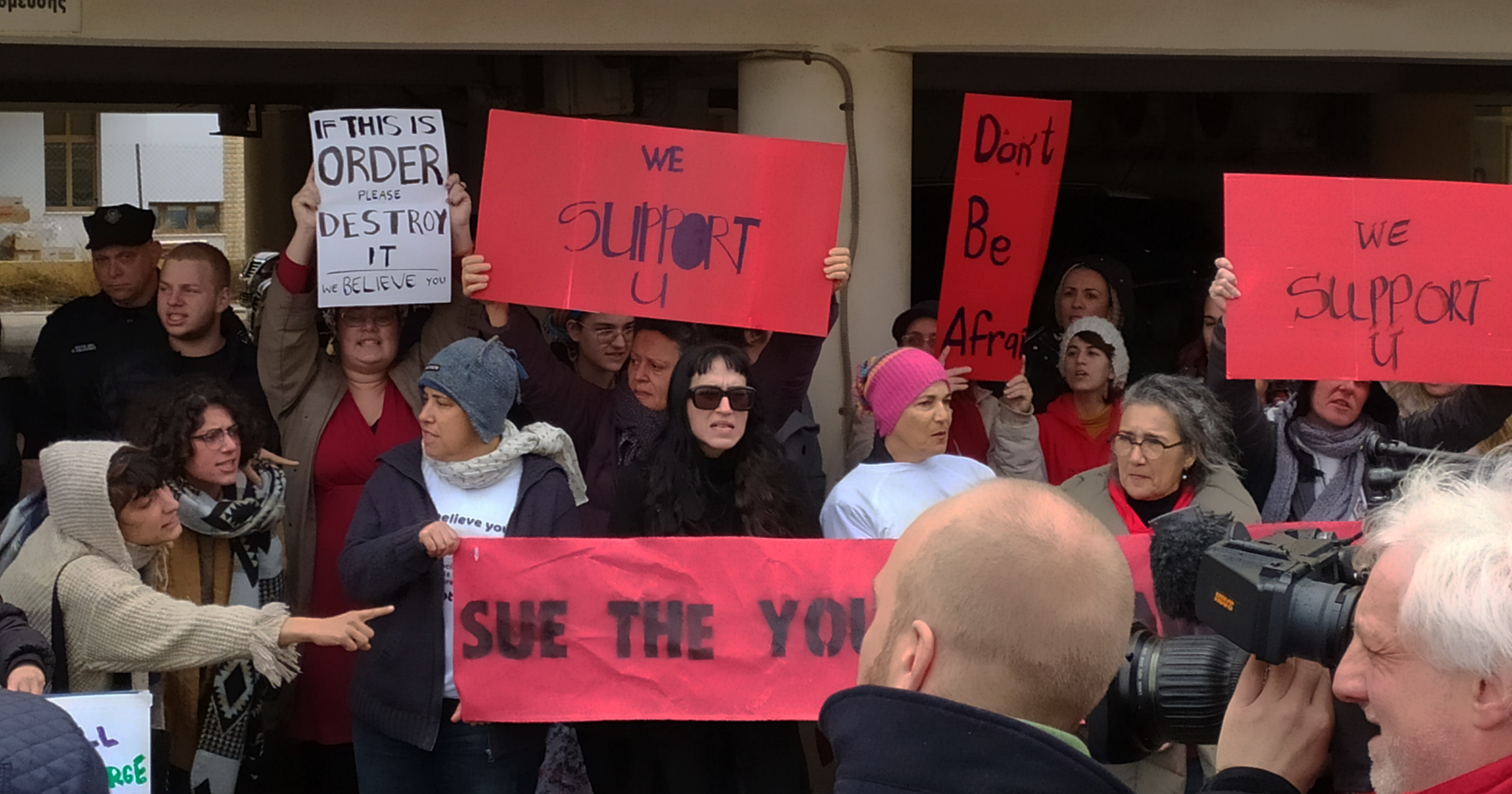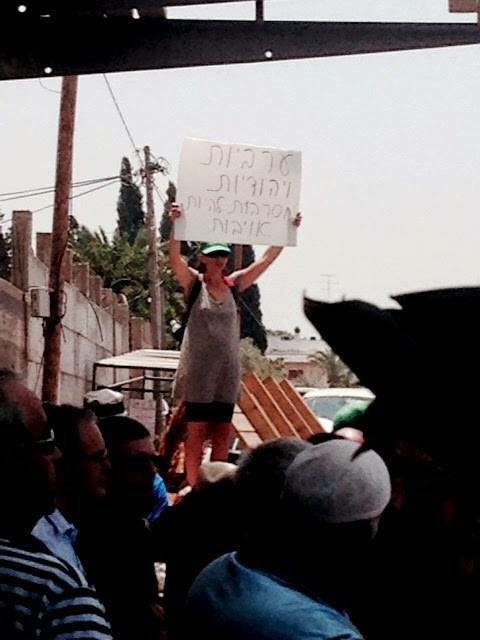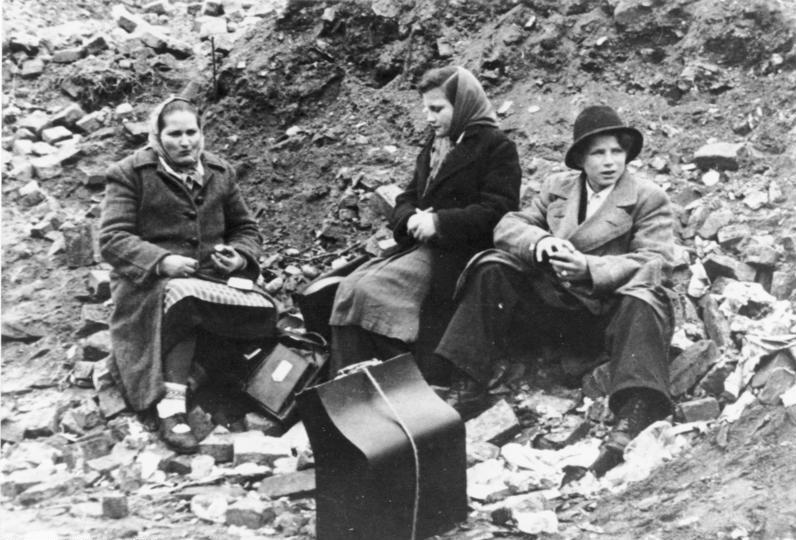Written by Naama Katiee, a mizrahi* feminist, active in “Amram”
translated by: Inbal Ketzef
*jews originating in Arab/Muslim countries
“It was already eight o’clock, when 3 people suddenly appeared – two women and one man. The man was bald and had a long beard. The two women were maybe 40-45 years old. They came. Talked Yiddish and took the children with them…where are you taking the babies? We’re taking them to the doctor. Where? Beer-Yaakov. When will you bring them back? A week, two weeks, three weeks. I was sitting there with my baby in my arms, they came out with 14 babies. I said to myself when they’re out and she comes in I’ll take the child and run. Suddenly the two women came back – give me your baby. I said I will not. Give us your baby! And I held the baby like so. One of them held my arms and the other took the baby and ran.”
“I started looking, going from one floor to another: women, men, elders, until I found the children, but I couldn’t find her. I went down to the office and told them: “either you thieves give me back my baby or I’ll call the police”. I wasn’t scared. They said “if you don’t see her she’s not here. Go away crazy lady..”. At night I heard the nurses talking “she’s not going to give up, it’s obvious, why won’t they give her back her baby, it’s not nice”. You see they thought I didn’t understand Hebrew, I always talked Arabic and Yemenite with a little Hebrew.”
Between 1948 and 1954 thousands of babies and toddlers were abducted from their families, most of them fresh Jewish immigrants from Yemen and other Arab countries (“mizrahi”) temporarily staying in holding camps. Almost all children disappeared after being taken to medical or welfare facilities. Parents were told the children had died – without any proof given – they were not shown bodies and were not allowed to bury their children. Many years later many of the families received by mail draft notices and other government and official letters sent to the these supposedly dead children. In some cases fathers were taken into custody after their supposedly long-dead children had deserted from the army. In the decades since, the families have been fighting to find out what had really happened to their children, encountering only disparagement, cover-ups and bureaucratic obstacles. In 1995, after a high-profile battle led by the Yemenite Rabbi Uzi Meshulam, a formal governmental inquiry committee was appointed.
The committee was active the following six years. Families, nurses, doctors, ambulance drivers, government officials and many more appeared before the committee. “Yemenite parents did not care about their children” was the testimony of former Chief Nurse Sonja Milstein before the committee, referring in her testimony to the babies as “packages” and “corpses”. Milstein added that “40 years later, I would have been happy to know my child had received a good education”, leaving even judge Yehuda Cohen in shock. Ahuva Goldfarb, another chief nurse, said in an interview “maybe we did them a favor”.
(The late) Zippy Talmor, in her documentary “One Way Road” attempts an interview with Masha Kaplan, the former nurse of Camp Hashed and several other nurseries. “This is my rest time…I have no interest in this…I’m asking you to please drop it” says Kaplan. Several mothers testified that Kaplan was actively involved in kidnapping their children upon arrival in Israel.
Many testimonies mention women’s part in these events. Nurses, instructors, social workers – mostly women came in touch with the mothers whose children were taken. Mothers say these women were cold, belittling, alienating, emotionless and sometimes resorted to threats or even violence. This could have been explained by individual women’s racism, and even if appalled by this lack of solidarity presented by western women – often mothers themselves – towards young mizrahi women it could be summed by marking them as racists, as possible with any gender, sex, color or nationality. But these were not isolated incidents. These western women in these events did something far worse than being insensitive or (knowingly or unknowingly) collaborating with this patriarchal crime against those less privileged – the fact of the matter is that the first hebrew feminist organization were high up in this system of abductions.
Hannah Safran explains in her book “Don’t Wanna be Nice Girls” the women’s organizations of the 1920s and 1930s were not only organizations of women, but actively pursuing advancements of women’s rights. These organizations fought for women’s right to vote and be elected, and promoted equality in employment and the legal system in Israel’s early days. These organization, says Safran, were de-facto Israel’s first wave of feminism.
But these well-meant and fruitful activities did not exclude treating the mizrahi women patronizingly, based on racism and colonialism. In her book “We Are Here to Bring the West”, Dafna Hirsch describes how the women of “Hadassah” viewed the mizrahi people: “In western eyes, they seemed as if the light of the developed world has never touched them”. Hadassah was not the only organization active in the mizrahi community – most of the preventative medicine and welfare initiatives were lead by western women and the organizations they lead. In the early 1950s, after the state of Israel was created, there was a massive wave of immigrants from Arab countries, and these organizations reacted by focusing their energy on the re-education of these immigrants, thought of as unfit for young modern Israeli society. “These organizations both treated the mizrahi people as objects in need of education and culture, as well as a part of the young state’s collective.
Jewish immigrants from anywhere in Europe were not perceived in need of a re-education, but Arab and mizrahi jews were seen as lacking in basic hygiene, endangering their own health and the environment. Hirsch quotes Yehudit Harari, an educator who wrote “even the poorest european mother knows to keep her babies clean, mend their clothes and shine their shoes”. This attitude towards the mizrahi community resulted not only in serious misunderstandings of this society’s needs and cultures, but most of all marked them as dangerous to themselves and to society – a community whose habits and culture need to be eradicated at all cost.
The late Avigdor Pe’er, former deputy manager of the Welfare Ministry Immigrant Department, revealed in his testimony that the children deceitfully taken from their parents were handed over to the women’s organizations. The same organizations promoting women’s rights were at the same time taking children – mostly mizrahi children – forcefully and deceitfully from their parents. In the name of “the good of the children” or maybe even more so “the good of society” the women’s organizations violated these newly arrived immigrants’ right to parent their children, and those children’s right to grow up in their own homes. Abusing their immense power over these families, who were extremely dependant on them, instead of caring for the health and well-being of the population, they took an active part in operating this network organizing children for adoption.
The parents’ testimonies are heartbreaking. Happiness over a baby being born alive and healthy turning in a matter of hours into grief over an abrupt and crass declaration of the baby’s death. Young mothers asked to put up their newborn for adoption “because there are so many children at home as it is”, refusing, and upon refusal receiving news of the baby’s death, never seeing the baby again. Mothers begging to breastfeed the babies held in the nursery are refused and removed forcefully. Toddlers taken to the hospital with a minor cold or diarrhea disappear as if they never existed, their parents sent home and being told “go away, no child here, the child is dead”. Mothers telling stories of nurses ripping a healthy baby from their arms and taking off with them. Penniless parents riding a donkey or a rundown bus from one hospital to another, across the country, only to have doors closed before them over and over again.
The formal inquiry committee gave no answers. The committee declared most children indeed died – without any clear evidence of this, practically absolving the establishment, citing them merely with negligence and some disorder. The committee did manage to put the blame on the victims – “the families should have monitored and supervised the babies’ return from the hospitals after recovering, and upon death should have seen to the burials”. This is nothing less than outrageous victim-blaming. The families – having recently arrived in Israel, lacking any resources including the ability to speak the language – are the ones found guilty in the children’s disappearances; while the establishment – clearly the powerful party in the situation – is almost completely exonerated. The committee’s conclusion left the families in shock, broken with disbelief. Not only was it concluded the abductions had never happened, the families made to look as a bunch of raving lunatics – in the few cases the committee did acknowledge the so-called “random putting up for adoption” the families were found responsible.
Israeli feminists stayed quiet. They still do.
It seems these events can shed some light on the complex relations of Israeli feminists with mizrahi women and their communities. These communities are deeply scarred because of their treatment by medical personnel and women’s organization. These mizrahi women had developed a deep and inherent mistrust of doctors and nurses, but not only towards them, but also towards local feminists. Can you blame them? Can you blame women that the mere mentioning of the names “Hadassah” or “Wizo” automatically brings up horrible memories of the baby disappearing suddenly? The child taken from their arms? No-one ever held accountable? Can you blame mizrahi women for not trusting – to this day – nurses, doctors, or “white” women at all?
Mizrahi feminists are often asked “why don’t mizrahi women feminists see themselves as part of the Israeli feminism? Why are we divided?” but can you imagine how or why would these women, and their daughters and granddaughters, still carrying this trauma, abide with this call for feminist solidarity, when other feminists still deny or suppress these events taking place? A relationship formed after a horrendous crime committed against the bodies and souls of mizrahi women, continued by disregard and denial, can never grow to be a relationship of trust and cooperation.
Israeli feminists must acknowledge the crimes committed here, and take responsibility for their part in what happened. They must face the old parents before their deaths, the brothers and sisters who are still here, who grew up with these stories and admit – we were accomplices in these crimes. Israeli feminists, claiming brave criticism, caring for women, children and all those less privileged – must face these demons. The alternative is questioning Israeli feminism’s own right to existence.
We have been fighting these last years to keep these events in the public eye, exposing the victims’ testimonies to the public and acknowledge the crimes committed against these communities. In the last months we have been cooperating with “Physicians for Human Rights” in advancing an appeal to open the confidential archives – specifically those documenting the medical personnel actions. This is not an easy struggle, not with the Israeli public nor the establishment. A feminist organization can join and support this fight in solidarity, but also as a first a necessary step in taking responsibility and making amends.
(I would like to thank Lilach Ben-David, Racheli Said and Ortal Ben-Dayan for their help with this article)
The Amram NPO has been commemorating the death of Rabbi Uzi Meshulam for the last 3 years, as the day of awareness and remembrance for The Yemenite, Balkan and Eastern Babies Affair, and holds events in several cities including testimonial, conversation and lectures.



